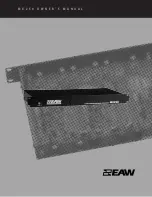
Functional Description
11.3 Functional Description
This chapter discusses the architecture of the EDMA3 controller.
11.3.1 Functional Overview
11.3.1.1 EDMA3 Channel Controller (EDMA3CC)
shows a functional block diagram of the EDMA3 channel controller (EDMA3CC).
The main blocks of the EDMA3CC are as follows:
•
Parameter RAM (PaRAM): The PaRAM maintains parameter sets for channel and reload parameter
sets. You must write the PaRAM with the transfer context for the desired channels and link parameter
sets. EDMA3CC processes sets based on a trigger event and submits a transfer request (TR) to the
transfer controller.
•
EDMA3 event and interrupt processing registers: Allows mapping of events to parameter sets,
enable/disable events, enable/disable interrupt conditions, and clearing interrupts.
•
Completion detection: The completion detect block detects completion of transfers by the EDMA3TC
and/or slave peripherals. You can optionally use completion of transfers to chain trigger new transfers
or to assert interrupts.
•
Event queues: Event queues form the interface between the event detection logic and the transfer
request submission logic.
•
Memory protection registers: Memory protection registers define the accesses (privilege level and
requestor(s)) that are allowed to access the DMA channel shadow region view(s) and regions of
PaRAM.
Other functions include the following:
•
Region registers: Region registers allow DMA resources (DMA channels and interrupts) to be assigned
to unique regions that different EDMA3 programmers own (for example, ARM).
•
Debug registers: Debug registers allow debug visibility by providing registers to read the queue status,
controller status, and missed event status.
The EDMA3CC includes two channel types: DMA channels (64 channels) and QDMA channels (8
channels).
Each channel is associated with a given event queue/transfer controller and with a given PaRAM set. The
main thing that differentiates a DMA channel from a QDMA channel is the method that the system uses to
trigger transfers. See
.
876
Enhanced Direct Memory Access (EDMA)
SPRUH73H – October 2011 – Revised April 2013
Copyright © 2011–2013, Texas Instruments Incorporated
















































